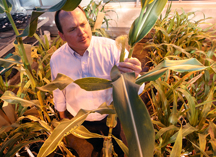Purdue gets grant to improve heat-stress tolerance of maize
March 26, 2013
 |
|
Mitch Tuinstra and collaborators will work to develop heat
tolerance in maize. (Purdue Agricultural Communication photo/Tom Campbell)
|
WEST LAFAYETTE, Ind. - Purdue University scientists will receive $1.1 million to find ways to increase maize's tolerance to heat.
The work will be done through the International Maize and Wheat Improvement Center to develop heat-tolerant maize for Asia with funding from the U.S. Agency for International Development.
Mitch Tuinstra, a Purdue professor, Wickersham Chair of Agronomy and principal investigator of the grant, said finding ways to grow maize in the hotter climates of South Asia could help combat malnutrition and hunger issues in those countries. Understanding ways to adapt the crop to heat and drought could also help growers in the United States where climate change is expected to increase stress on crops.
"There is a lot of concern about how climate change will affect crops, but we know almost nothing about thermal tolerance in corn," Tuinstra said.
Tuinstra and co-principal investigator Guri Johal, a Purdue professor of botany and plant pathology, will evaluate temperate and tropical types of maize to identify genes and determine physiological mechanisms that allow them to stand up to heat and drought stresses. They will work with collaborators in India, Pakistan, Bangladesh and Nepal.
"This is work that takes Purdue's strength in plant genetics and uses it to address problems that we share with people all around the world," Purdue President Mitch Daniels said.
The work is part of a larger public-private partnership called the Heat Tolerant Maize for Asia project. Private partners, including Pioneer Hi-Bred, Vibha AgriTech, Ajeet Seeds and Kaveri Seeds, will join national agriculture research programs in India, Nepal, Pakistan and Bangladesh.
"Dr. Tuinstra's work embodies the College of Agriculture's commitment to research with purpose leading to discovery with impact," said Jay Akridge, the Glenn W. Sample Dean of the College of Agriculture. "This work to improve crops through his genetics research has the potential to not only help U.S. growers but also make important advancements in efforts to feed the world's growing population."
The project is a public-private alliance led by the International Maize and Wheat Improvement Center. It includes Purdue and Pioneer Hi-Bred, as well as public and private sector maize breeding programs in South Asia.
Writer: Brian Wallheimer, 765-496-2050, bwallhei@purdue.edu
Sources: Mitch Tuinstra, 765-494-5895, drmitch@purdue.edu
Jay Akridge, 765-494-8391, akridge@purdue.edu
Mitch Daniels, president@purdue.edu
Related website:
Purdue Department of Agronomy
Ag Communications: (765) 494-2722;
Keith Robinson, robins89@purdue.edu
Agriculture News Page

